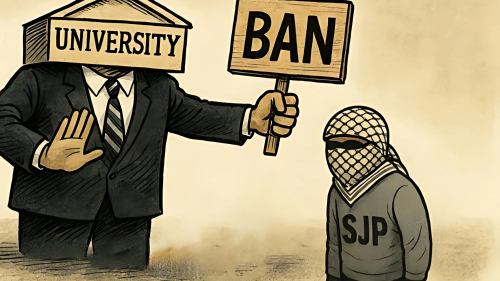Listen to A.J. Caschetta discuss the cases of Zazi and Lindh in this May 22 radio interview.
Two prominent al-Qaeda fighters will be let out of prison days from now — both cases of early release.
Najibullah Zazi will be released any day now. Zazi followed Anwar al-Awlaki’s advice in a plot to bomb subways in New York City, but was caught before he could kill anyone.
According to federal authorities, Zazi has been a model of cooperation, providing information on individuals and testifying against his fellow mujahedeen, including his own father. He could have been sentenced to life in prison, but instead will be released after 10 years.
On May 23, John Walker Lindh, enemy detainee #001 in the Bush administration’s Global War on Terror, is scheduled to be released from prison. Unlike Zazi, Lindh has not been cooperative, and yet he is released early for “good behavior.”
After leaving home at the tender age of 17 to find himself among Islamist schools in Yemen and Deobandi madrassas in Pakistan, Lindh joined the Harakat-ul-Mujahedeen, a terrorist organization whose founder, Fazlur Rahman Khalil, was one of the signatories to the 1998 World Islamic Front’s Declaration to Wage Jihad Against Jews and Crusaders, otherwise known as al-Qaeda’s Declaration of War Against Americans.
Lindh was captured at the battle for Mazar-i-Sharif in 2001, and detained with hundreds of others in the Qala-i-Jangi fortress. When the prisoners staged an uprising, CIA Officer Michael Spann became the first American killed in the newly declared War on Terrorism.
We are still treating jihadis as common criminals rather than enemy combatants. |
In February 2002, U.S. Attorney General John Ashcroft said of Lindh that he “chose to train with al-Qaeda, chose to fight with the Taliban, chose to be led by Osama bin Laden.” Ashcroft listed the details of the Justice Department indictment and pointed out, “If convicted of these charges, Walker Lindh could receive multiple life sentences, six additional 10-year sentences, plus 30 years.”
Even though the Taliban was never formally recognized as the government of Afghanistan, Lindh also could have been charged with serving in the military of a foreign country and stripped of his U.S. citizenship. He also could have been classified as an enemy combatant for training with al-Qaeda. Instead, he was processed like a regular criminal. He lawyered up, pushed back, and was given a plea deal involving a single count of “supplying services to the Taliban and carrying weapons.” It was the first in a series of steps that minimized the crimes of jihadis by deflecting attention to the alleged “rough interrogation tactics” of the U.S. military and the “unfair practices” of law enforcement.
Rather than adhere to Ashcroft’s early condemnation, the Justice Department backed off in the glare of bad publicity. Under the terms of the bargain, Lindh accepted a 20-year sentence and agreed to cooperate with U.S. investigators. Now he’s scheduled to be released before serving his full 20 years are up, in spite of his failure to cooperate. In fact, he’s completely unrepentant. His prison poetry suggests he is still a dedicated jihadi, and paroled jihadis have a history of returning to their jihad.
John Walker Lindh, shown during his study at an Islamic school in Pakistan in 2000-2001. |
But it gets worse, because Lindh was allowed to acquire Irish citizenship while in prison. He now plans to move to Ireland. He currently refers to himself as Abu Sulayman al-Irlandi. Ireland says he’s welcome.
Allowing Lindh in 2002 to plea down from the treason charge he deserved was bad policy. Letting him out of prison two years early in 2019 is worse still. It shows that we are still treating jihadis as criminals rather than terrorists.
Not everyone is concerned about Lindh. James Carafano of the Heritage Foundation wrote at Fox News of Lindh’s release, “Instead of picking up a gun or a bomb or machete, Lindh might elect to continue his jihad by grabbing a microphone, or a computer keyboard, or a Twitter account. Big deal.” Carafano overlooks the reality that a skilled propagandist can be more dangerous than an operational terrorist. A charismatic role model can inspire hundreds of unskilled attackers — such as “truck jihadis,” who need only know how to drive.
If al-Qaeda fighters were treated as illegal combatants rather than common criminals, Zazi would be spending many more years in prison and Lindh would not have been offered a plea deal. Because of his cooperation, Zazi has become an al-Qaeda target and will likely be followed closely for the rest of his life, perhaps in the witness relocation program. There may be nothing that can be done about Lindh’s early release, but he should not be issued a passport. Instead, he should be kept under close surveillance and sent back to prison after even the slightest violation of what would be very restrictive parole terms.
Zazi’s and Lindh’s cases are reminders that nearly 18 years after 9/11, we’re still treating terrorists like criminals to be processed through the criminal justice system, rather than enemy warriors to be interrogated and processed by the Department of Defense.
A.J. Caschetta is a Ginsberg-Ingerman fellow at the Middle East Forum and a principal lecturer at the Rochester Institute of Technology.









